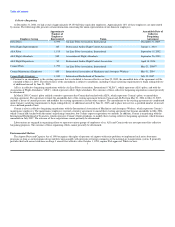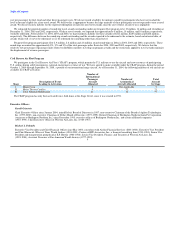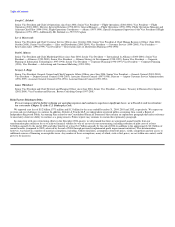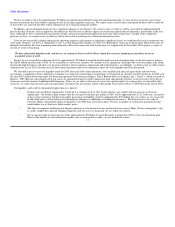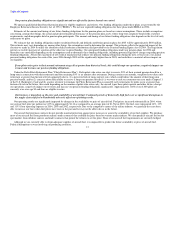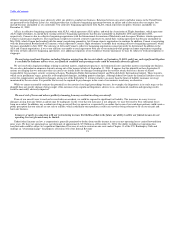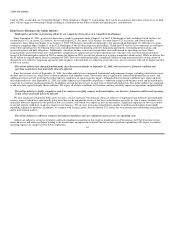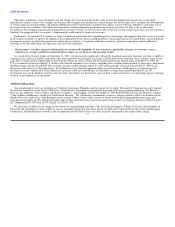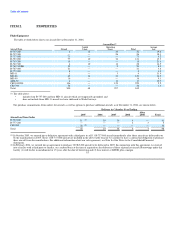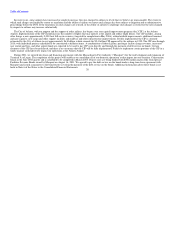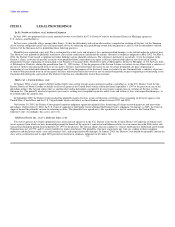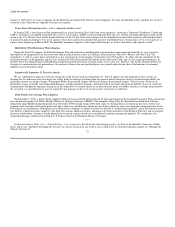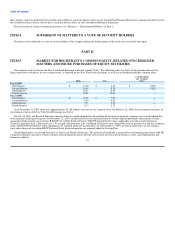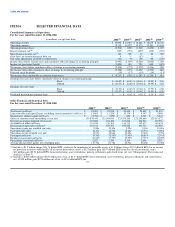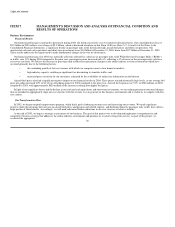Delta Airlines 2004 Annual Report Download - page 21
Download and view the complete annual report
Please find page 21 of the 2004 Delta Airlines annual report below. You can navigate through the pages in the report by either clicking on the pages listed below, or by using the keyword search tool below to find specific information within the annual report.
Table of Contents
Other laws, regulations, taxes and airport rates and charges have also been imposed from time to time that significantly increase the cost of airline
operations or reduce revenues. For example, the Aviation and Transportation Security Act, which became law in November 2001, mandates the federalization
of certain airport security procedures and imposes additional security requirements on airports and airlines, most of which are funded by a per ticket tax on
passengers and a tax on airlines. The federal government has recently proposed a significant increase in the per ticket tax. Due to the weak revenue
environment, the existing tax has negatively impacted our revenues because we have not been able to increase our fares to pass these fees on to our customers.
Similarly, the proposed ticket tax increase, if implemented, could negatively impact our revenues.
Furthermore, we and other U.S. carriers are subject to domestic and foreign laws regarding privacy of passenger and employee data that are not consistent
in all countries in which we operate. In addition to the heightened level of concern regarding privacy of passenger data in the United States, certain European
government agencies are initiating inquiries into airline privacy practices. Compliance with these regulatory regimes is expected to result in additional
operating costs and could impact our operations and any future expansion.
Our insurance costs have increased substantially as a result of the September 11 terrorist attacks, and further increases in insurance costs or
reductions in coverage could have a material adverse impact on our business and operating results.
As a result of the terrorist attacks on September 11, 2001, aviation insurers significantly reduced the maximum amount of insurance coverage available to
commercial air carriers for liability to persons (other than employees or passengers) for claims resulting from acts of terrorism, war or similar events. At the
same time, aviation insurers significantly increased the premiums for such coverage and for aviation insurance in general. Since September 24, 2001, the
U.S. government has been providing U.S. airlines with war-risk insurance to cover losses, including those resulting from terrorism, to passengers, third parties
(ground damage) and the aircraft hull. The coverage currently extends through August 31, 2005 (with a possible extension to December 31, 2005 at the
discretion of the Secretary of Transportation). The withdrawal of government support of airline war-risk insurance would require us to obtain war-risk
insurance coverage commercially. Such commercial insurance could have substantially less desirable coverage than currently provided by the US
government, may not be adequate to protect our risk of loss from future acts of terrorism, may result in a material increase to our operating expenses and may
result in an interruption to our operations.
Additional Information
General information about us, including our Corporate Governance Principles and the charters for the Audit, Personnel & Compensation, and Corporate
Governance committees of our Board of Directors, can be found at www.delta.com/inside/investors/corp_info/corp_governance/index.jsp. Our Board of
Directors has adopted a "Code of Ethics and Business Conduct," which applies to all of our employees. Our Board of Directors has also adopted a separate
"Code of Ethics and Business Conduct for the Board of Directors." We will disclose amendments to and any waivers granted to officers or members of the
Board of Directors under these codes promptly on our website. Copies of these codes can also be found at www.delta.com/inside/investors/corp_info/
corp_governance/index.jsp. We will provide print copies of these materials to any shareowner upon written request to Corporate Secretary, Delta Air Lines,
Inc., Department 981, P.O. Box 20574, Atlanta, GA 30320-2574.
We also make available free of charge on our website our Annual Report on Form 10-K, our Quarterly Reports on Form 10-Q, our Current Reports on
Form 8-K and amendments to those reports as soon as reasonably practicable after these reports are filed with or furnished to the Securities and Exchange
Commission. Information on our website is not incorporated into this Form 10-K or our other securities filings and is not a part of those filings.
17


